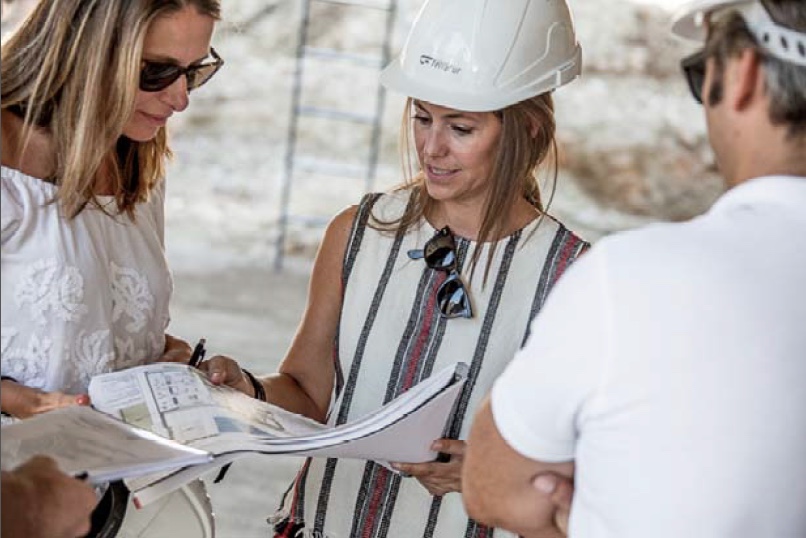Technical works management
Works management with full guarantees
Works management is a necessary process that plays a crucial role in any construction project. It is for this reason that JEME provides a well-structured and methodical service in order to oversee each phase of the process, not just on paper or in terms of the building work, but also keeping strict controls on deadlines and costs. On completion of each phase, a report is drawn up detailing any possible deviations to the contracted services. Clients also receive optimum advice and consultancy services.
WHY IS TECHNICAL MANAGEMENT NECESSARY?

Technical Management is a required process for the majority of construction projects and plays a crucial role when undertaking any venture. The Site Managers ensure that the plans are correctly applied, supervising the standard of the construction techniques and the materials used.

FAQs
Contracting this service is compulsory in the following cases:
A• New construction, except those requiring little construction work involving simple techniques and that are not intended for temporary or permanent residential or public use and consist of a single floor.
B• Extension, alteration, renovation or rehabilitation works that modify a building’s architectural layout. This is understood to include all those where partial or full intervention will lead to basic variations on the general exterior composition, volume measurements or the overall structural system, or which are intended to change a building’s principal use.
C• Full intervention projects on buildings that are listed or subject to some form of environmental or historical and artistic protection, regulated via legal provisions or urban planning documents, as well as other partial intervention projects affecting the elements or sections subject to protection.
Article 13 of the Spanish Building Act 38/1999 of 5th November (LOE in its Spanish initials) regulates the functions of the Project Implementation Manager, which are as follows:
A• To manage the implementation of the works, reassessing and ensuring the correct use and application of the building elements and installations, in accordance with the project and the instructions issued by the Site Manager.
B• To ensure that the standard of the various products to be used in the works corresponds to that contracted and that it complies with all enforceable building regulations, as well as commissioning all necessary tests and trials.
C• To check partial certificates; namely to ensure that the amount invoiced at each stage of the works corresponds precisely to the amount of work completed and included in each invoice, as well as the final settlement of completed work units.
D• To record the necessary instructions in the Construction Log Book.
E• To sign the variation order at the start of the construction work and the final certificate.
F• To work with the various agents on the work carried out, providing the results of the completed inspection processes.

WHY IS HEALTH AND SAFETY COORDINATION NECESSARY?

Health and Safety coordination is a compulsory procedure in most projects, providing a means of supervising the various technical and human agents involved in the process, ensuring compliance with occupational risk prevention in accordance with the legislation in force. At JEME we guarantee full and strict safety supervision.
FAQs
Whenever more than one company or one sole trader is involved in the works process, or when the building company subcontracts any tasks, the developer is required to hire this agent prior to the commencement of work, regardless of whether the project has required a Health and Safety or a Basic Health and Safety study.
Pursuant to article 9 of Spanish Royal Decree 1627/1997 of 24th October, referred to above, the responsibilities of the Health and Safety Coordinator during the works phase are as follows:
A• To coordinate the implementation of the general risk prevention and safety principles in accordance with the Occupational Risk Prevention Plan presented by the building company and approved by the Coordinator prior to the commencement of work:
- When adopting technical and organisational decisions in order to plan the various tasks or phases to be implemented either simultaneously or successively.
- When estimating the time periods required for the various tasks or phases of the work.
B• To coordinate work site activities in order to ensure that contractors, and where appropriate, subcontractors and sole traders, apply in a coherent and responsible manner the preventive action principles when carrying out the work, with particular reference to the tasks or activities listed under article 10 of the Royal Decree, namely:
Maintaining the works site in a good state of order and cleanliness.
The choice of location for the various work areas and posts, taking into consideration factors such as site access conditions, and decisions regarding routes and areas of movement or traffic.
The handling of the various materials and the use of auxiliary equipment and machinery.
The maintenance, inspection prior to entry into service, setting up and regular inspections of all the facilities and devices necessary to carry out the work in order to correct any possible defects that may affect workers’ health and safety.
Marking out and duly fitting out the areas for depositing and storing the various materials, with particular attention to hazardous materials or substances.
The collection of used hazardous materials.
The storage, elimination or withdrawal of waste and rubble.
Depending on the progress of work, adapting the real time periods required for the various tasks or work phases.
Cooperation between contractors, subcontractors and sole traders.
Interaction and incompatibility with any other work or activity carried out on site or in the proximity thereof.
C• To approve the Health and Safety Plan drawn up by the contractor, and, where appropriate, any modifications made thereto.
D• To organise the coordination of business activities, as stipulated in article 24 of the Spanish Occupational Risk Prevention Law 31/1995 of 8th November (LPRL in its Spanish initials).
E• To coordinate actions and inspection functions for the correct application of work methods.
F• To adopt all necessary measures to ensure that access to the works site is restricted to authorised persons only.

